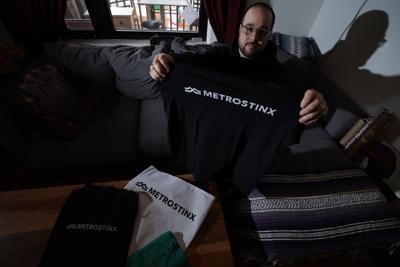Civil disobedience and protest come in many forms, and sometimes it’s cheeky and fun.
Such was the case when Christopher Lambe created a line of merchandise that altered Metrolinx’s familiar logo. “Metrostinx” resonated with the public as a comic riff on Metrolinx and many T-shirts, sweaters, tote bags and stickers were sold until the Metrolinx brand manager told Lambe to stop, which he eventually did.
Metrolinx wanted to protect its brand so halting its unauthorized subversion is understandable, but the fact that the term “brand” is being used here is partly why this was a good and worthwhile protest and why it resonated widely.
Metrolinx is a public agency we share a collective ownership of. It's rather personal, then, so the idea of calling it "Metrostinx" doesn’t seem like a big deal. I’m rather fond of the term “Metrojinx” and conjure it every time there’s a missed Eglinton Crosstown deadline or something major goes wrong, like Union Station crowding on New Year’s Eve. Cheeky nicknames can be a fun outlet. It’s what we do as humans.
The flip side is if somebody with ill will or bad faith subverted it, I might feel differently, so it’s a good idea to keep some integrity around the name. However, as is the case here, making a fuss about something as benign as "Metrostinx" risks triggering a “Streisand Effect.” This occurs when trying to hide something inadvertently makes it more well known, more famous. It's named after Barbra Streisand's attempt to get a photo of her Malibu mansion removed from a California coastal erosion documentation project.
Sometimes ignoring is a better option: I’ve already written "Metrostinx" three times here, now four.
Still, as an act of protest “Metrostinx” is also compelling because the agency controls a great deal of the lives of people in the GTHA. For those who take public transit, a bus or train car is as familiar as a personal automobile is to a motorist: they are all places we live a lot of our lives.
You might be interested in
If Metrolinx has a bad day, we have a bad day. If a Metrolinx project is delayed by years, goes over budget, causes many neighbourhoods’ worth of havoc, we all suffer.
Yet, there’s not much we can do about it, as we’ve seen with Eglinton Crosstown delays that nobody seems able to snap into shape. Yes, it’s a provincial Crown agency and our elected MPPs along with Premier Doug Ford provide ultimate oversight, but it’s a delayed, extended and diluted chain of response. There is no immediate satisfaction like the kind quitting a company or saying “Metrostinx” or “Metrojinx” might give us.
The very idea of “branding” for a public agency presents further difficulty. The general understanding of a brand comes from the corporate world and involves a product or service provided by a for-profit company. As consumers we gravitate to some brands, stick with them until they disappoint us, then we’re free to choose another brand. The free market, and all that.
It feels odd, then, to use language of the free market around something that is not part of that system. With a service like Metrolinx, though it’s thought of as a brand, there is no other service to switch to when we’re disappointed, frustrated, left on the curb or late for work. We’re stuck. We can’t “protest” by leaving, other than walking, biking or taking a car, options not open to everyone; the latter antithetical to why Metrolinx exists in the first place.
Though the notion of what constitutes a brand has been expanded to all sorts of areas, even to individuals, this language is consistent with the rise of calling people who use government services “clients” and the general corporatization of how people interact with agencies and departments providing those services. I’ve argued before that business jargon like this gives the impression of a customer-like relationship and the implied power of the consumer to insist on better, but with government agencies there’s a completely different dynamic at work.
Couple this with the problem of government communications in Canada. Despite large departments dedicated to communicating, we remain an opaque nation where public information is difficult to come by. Journalists here are routinely denied information requests that are routine in places like the United States.
In September, Metrolinx CEO Phil Vester promised updates on Eglinton in two months' time but that deadline came and went. If only Metrolinx communicated as well as it preserved its brand integrity. For instance, the agency has been running ads around town warning people to watch for Eglinton Crosstown vehicles being tested, which feels more like a public relations effort to mitigate lack of progress and real information around when it will open.
The very fact that the "Metrostinx" satire existed and was popular should cause the agency to reflect and make more of an effort sharing real information and being transparent than it does snuffing out a word I’ve now used seven times.












